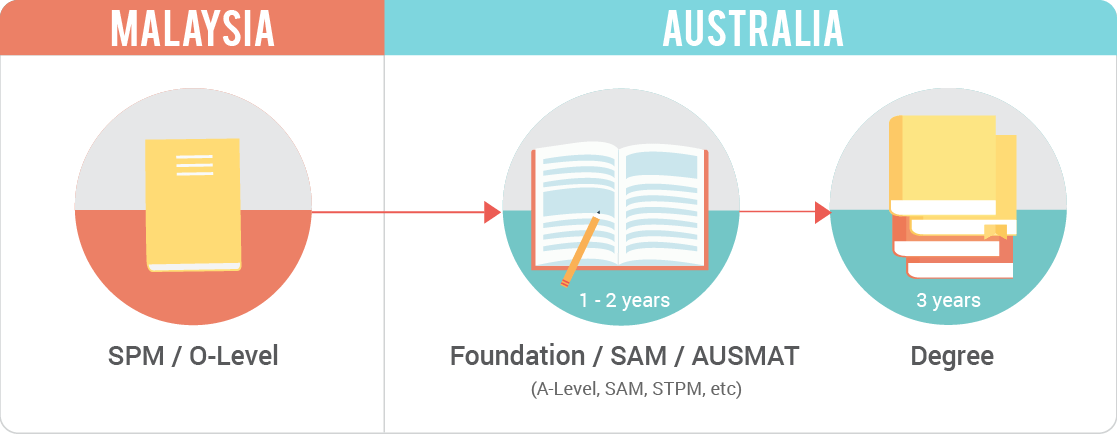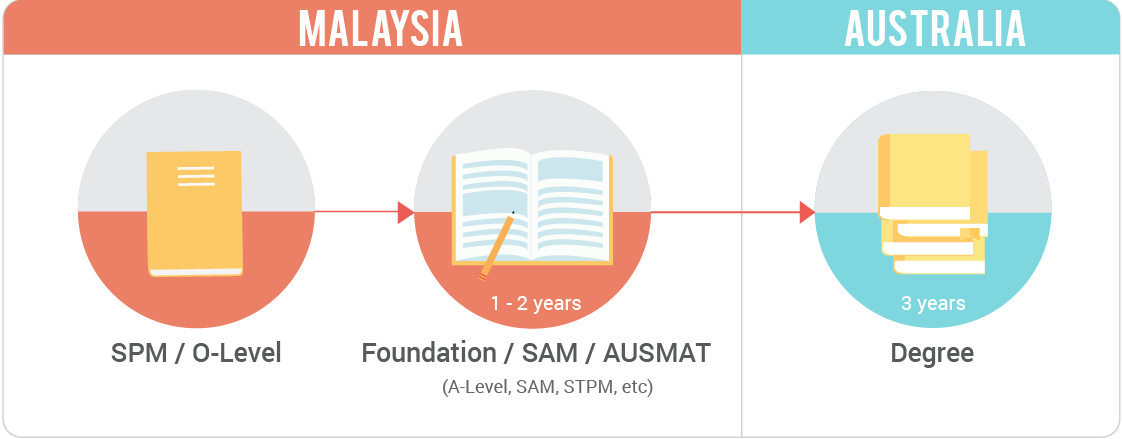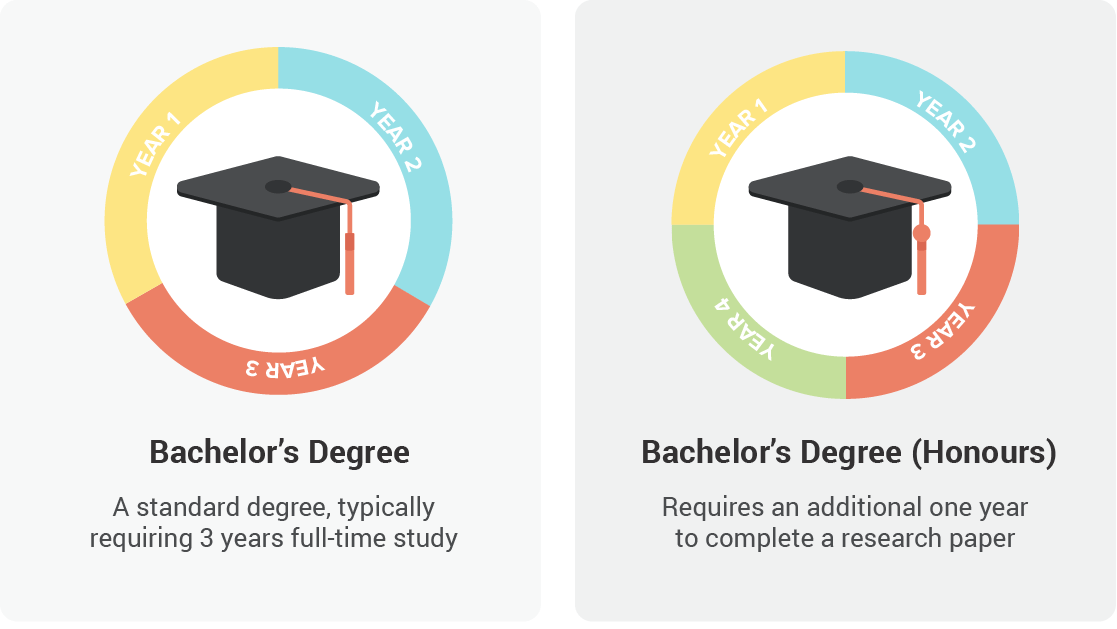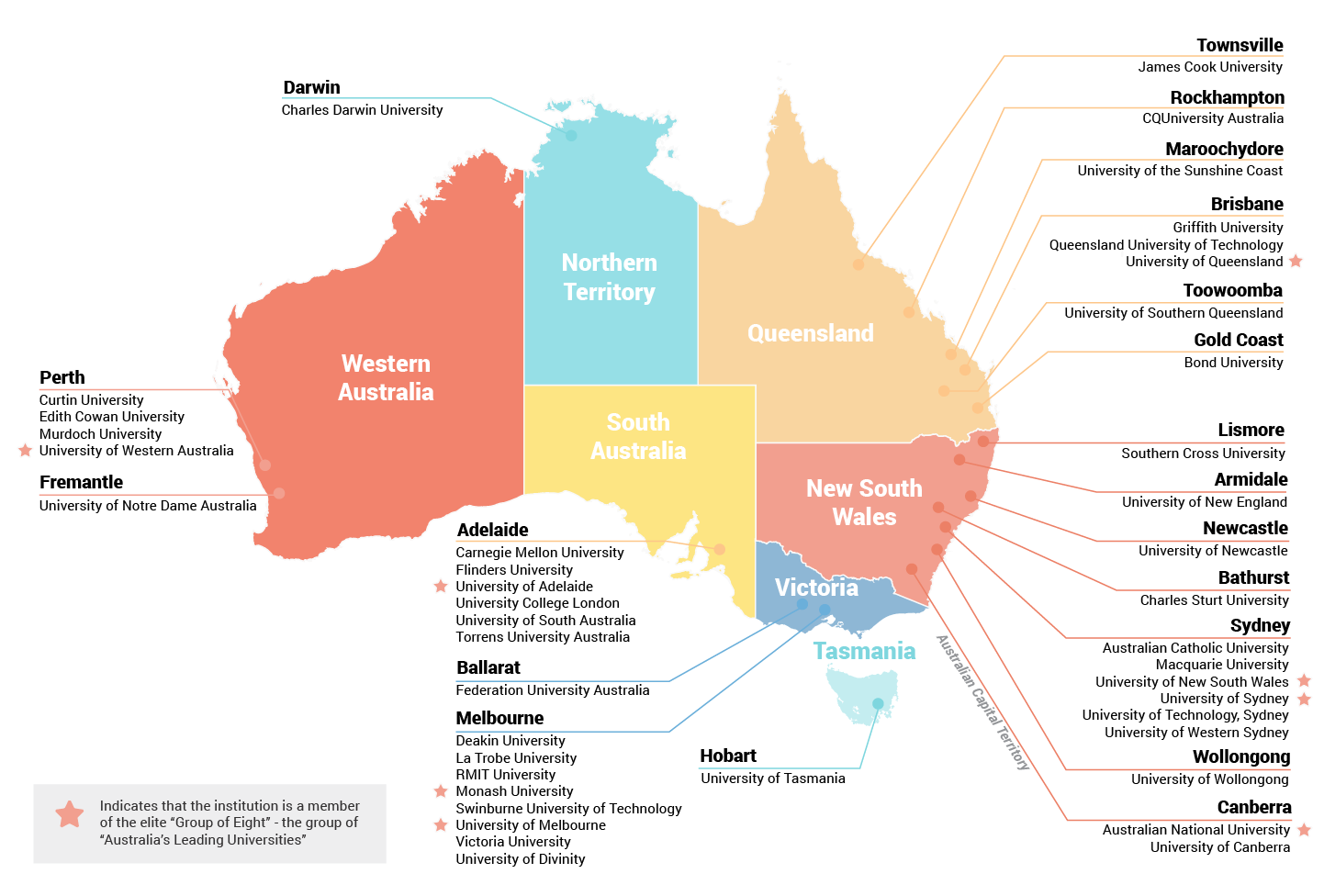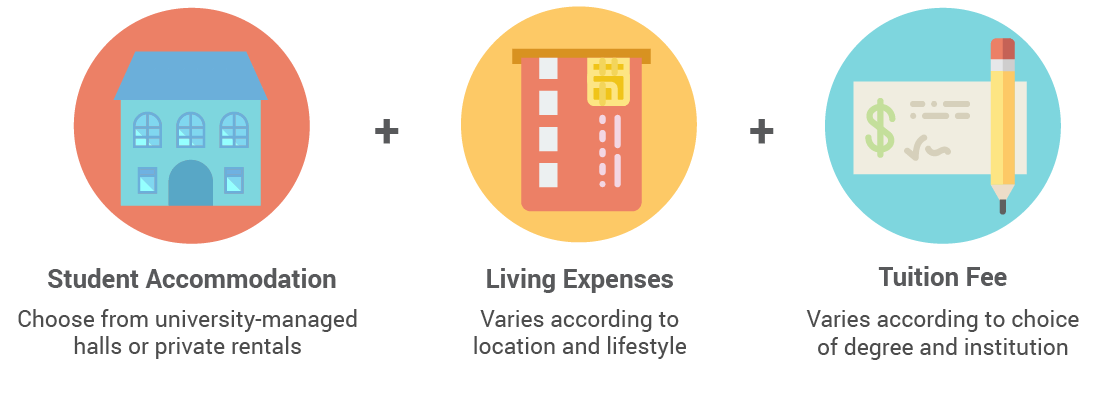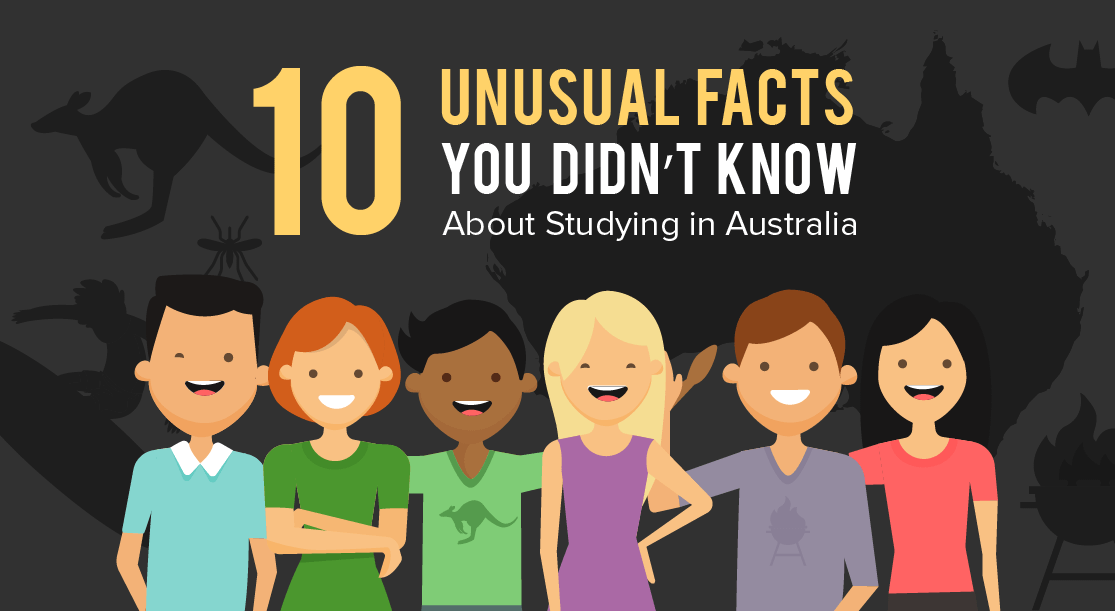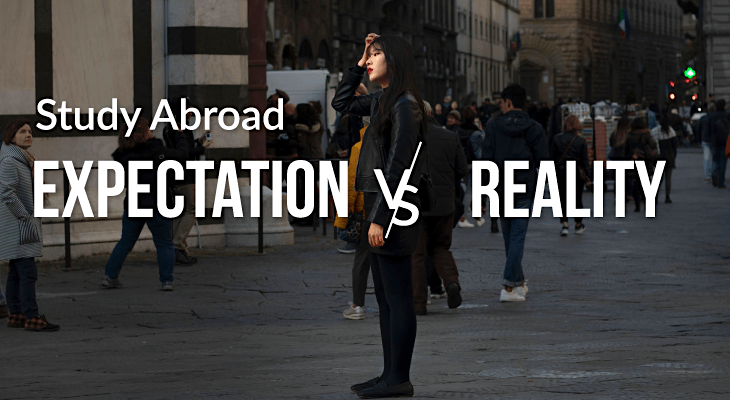The Beginner's Guide to Studying Overseas in Australia
Want to study overseas in Australia? In this guide, we explain how you can do it as a Malaysian student and cover cost of living in Australia, top Australian universities, visa application and more.
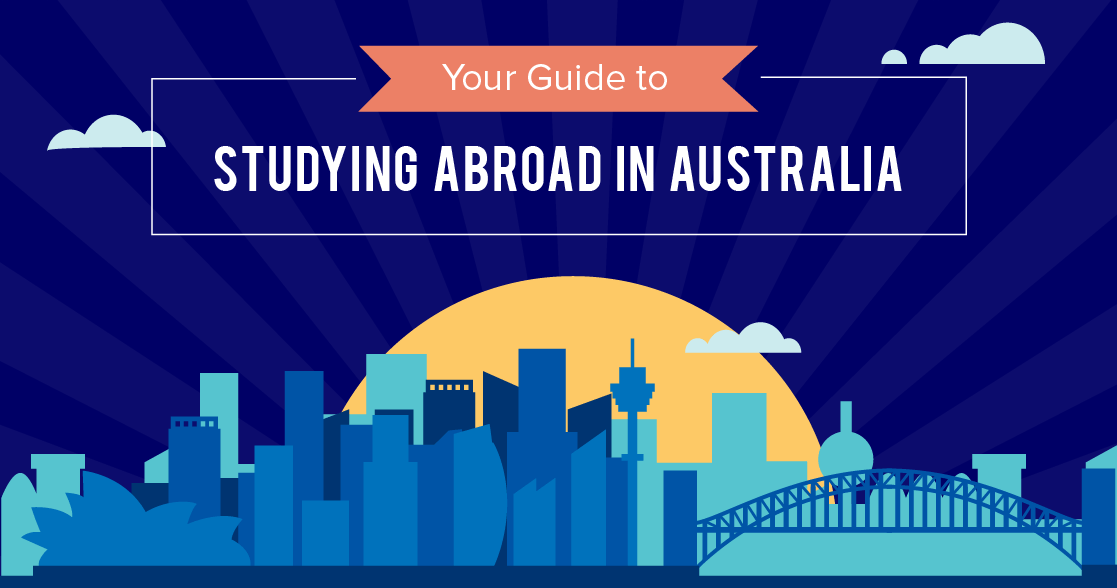
Are you fuelled by a blazing intention to study abroad in Australia?
We’re not surprised! As the number #1 study destination amongst Malaysians and the 3rd most popular in the world, Australia is a coveted study haven, and it’s not without solid reasons.
Whether it’s because of irresistible baits in the form of sandy beaches and deep azure oceans, or the lure of a remarkable higher education system that could very well be career and life altering, there are plenty of reasons why students flock to the Land Down Under.
If you feel the seduction of studying abroad in Australia, here is a comprehensive guide to get you started.
#1. Why Study Abroad in Australia
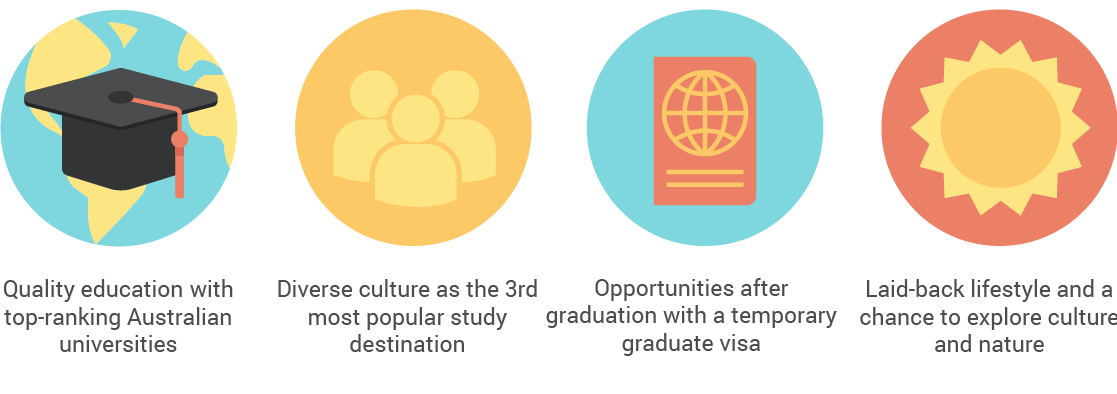
There are plenty of reasons to head to Australia for those precious undergraduate years, aside from being near the vast blue ocean hosting the world’s largest coral reef and the ceaseless laid-back barbecue sessions.
Here are some of the top reasons why you should study abroad in Australia.
a) Expose yourself to one of the finest higher education systems in the world
The presence of numerous universities in Australia gracing the top 100 in world rankings – whether it’s the Times Higher Education or QS World Rankings – speaks highly of the government’s commitment to providing quality education to students.
With household names such as The University of Melbourne, Australian National University (ANU) and The University of Sydney consistently being amongst the world’s best, it is a good indication of how high the standards are in Australia.
b) Experience a diverse and multicultural student population
As the 3rd most popular study destination in the world, Australia’s university campuses host many nationalities from all across the globe.
From the United States and Germany to Korea and South Africa, Australia is a melting pot of culture and ethnicity – and this is undeniably important. Research has shown that diversity increases creativity, innovation and problem-solving, all of which will undoubtedly enhance your university experience.
Not only that, Australia has one of the largest number of Malaysians outside of Malaysia, which means that you will hardly miss your nasi lemak, satay and all those Malaysian goodies despite being thousands of kilometres away from home.
c) Extend your stay in Australia after graduating
Compared to the UK and USA which have infinitely more stringent requirements, Australia is arguably a lot friendlier to graduating international students.
With the recent changes in the Australian government policy, international students now have the opportunity to remain in the country for a further 18 months (and up to 4 years, depending on qualification) without work or study restrictions via a “Temporary Graduate Visa”.
This means that you get a chance to embellish your CV with not just international education, but with international work experience too.
d) Enjoy a ‘work hard, play hard’ lifestyle
Australians are famed for their laid-back lifestyles. While there’s no qualm that Aussie students take their education very seriously, fortunately for us, they also approach their leisure time with the same load of commitment.
Many of the major universities in Australia are scattered along the east coast, with effortless access to parks, trails and of course, sunny beaches. The naturally gorgeous nation of New Zealand is also just a short flight away.
A social paradise aside, you can also be rest assured on Australia’s low crime rate and stern gun control laws, paving way to a safe environment.
#2. Overview of the Australian Higher Education System
a) The Basics
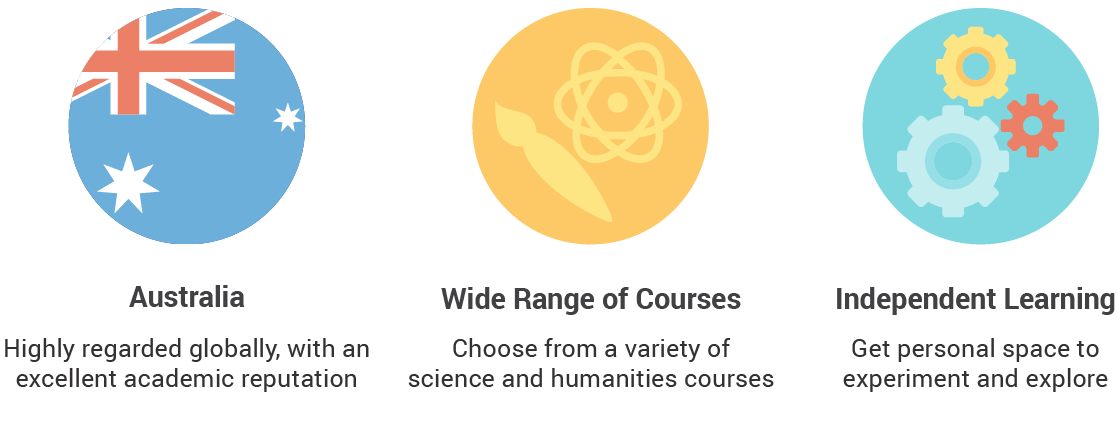 Australian universities are highly regarded around the world, having built an excellent academic reputation over the years.
Australian universities are highly regarded around the world, having built an excellent academic reputation over the years.
The Australian education system revolves around practical and independent learning to deliver an all-inclusive experience. Students are bestowed with a lot more personal space to improvise and experiment on their own projects in order to cultivate independent learners.
Australian institutions have a wide range of programmes – from health sciences to management and commence, humanities to engineering, and law to languages. With 43 universities, over 40 TAFE colleges (institutions that provide technical or vocational education), and thousands of courses, there is every chance Australia has you covered.
b) Pathway to Studying in Australia
If you have your heart set on soaking up some Australian sun, there are many ways for you to realise that deep-seated dream. Once you have completed your SPM, O-Level, IGCSE or an equivalent qualification, here are some options that you can explore.
(i) Australian Matriculation or Foundation in Australia → Degree in Australia
Jet-set to Australia right after your final year of secondary school by taking an Australian Matriculation or Foundation in one of the many colleges in Australia.
Options include Foundation courses for a direct pathway to your desired university or Australian Matriculation courses such as Western Australian Certificate of Education (WACE) or SACE International (also known as South Australian Matriculation). These are Year 12 qualifications, which is equivalent to STPM or A-Level in Malaysia.
From there, continue your education with an undergraduate degree in Australia.
(ii) Australian Matriculation in Malaysia → Degree in Australia
If you’re not quite prepared to fly free and be independent yet, you can choose to stick around for a year in Malaysia for a Pre-University course before going abroad.
The most popular (and practical) option for Australia-bound students is the SACE International or Western Australian Certificate of Education (WACE), but you can also choose to complete other Pre-University courses, such as A-Level or STPM.
Upon completion, you’ll be ready to make your way to Australia to complete your degree.
(iii) Pre-University or Foundation in Malaysia → Degree in Malaysia (1 to 2 years) → Transfer to Australian University (1 to 2 years)
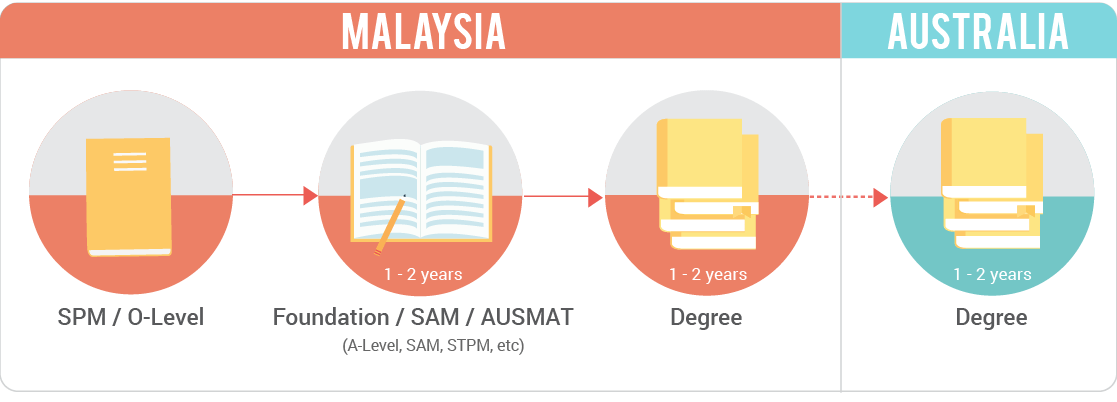
For a more cost-saving alternative, you can choose to study abroad in Australia for 1-2 years instead of the full 3-year undergraduate degree.
Begin with a Pre-University (e.g. A-Level, Australian Matriculation, etc.) or Foundation course in Malaysia, followed by 1-2 years of degree at a local university. After that, transfer over to an Australian university to complete your final 1-2 years and fulfil your lifelong dream.
Some universities have a list of partner universities abroad, which makes your transfer process a lot smoother. This means that many of your subjects will be transferrable to your destination university, and you can continue on with your studies without hassle.
Alternatively, you can still apply to transfer to other Australian universities outside the list of partner universities. However, a detailed assessment is usually required, and you may not receive credit for some of the subjects that you have taken.
(iv) Study a Semester Abroad in Australia during Your Undergraduate Degree
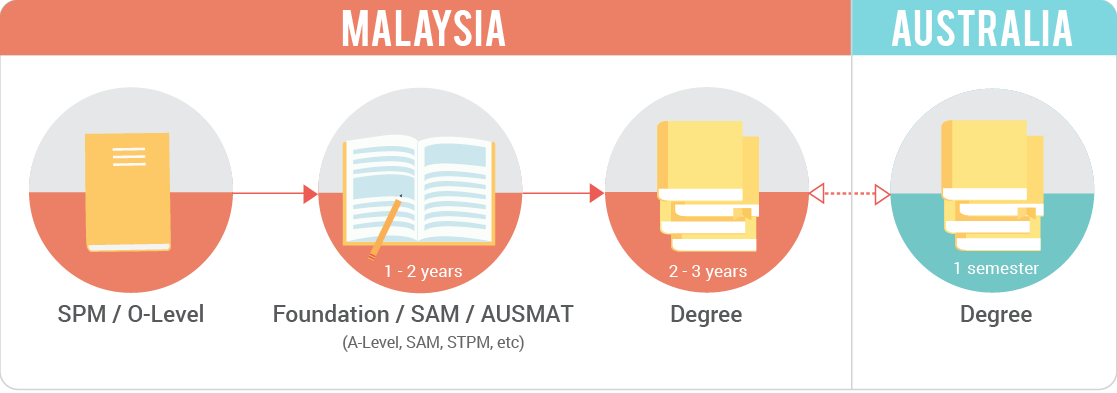
If none of the options above are realistic for you, don’t fret – there is still hope!
Some universities in Malaysia have a semester abroad or student exchange programme, where you can spend 1-2 semesters abroad studying at a partner university. For certain universities, you will only need to pay your Malaysian tuition fees (and not international tuition fees to your host university in Australia), plus your accommodation and living expenses.
It’s a great way for you to have a taste of student life abroad for a fraction of the cost.
c) Academic Duration & Year
The majority of undergraduate degrees in Australia are typically 3 years long. If you choose to do an Honours degree, it will be an additional 1 year.
The academic year in Australia kicks off in early March and runs through November. Most universities have 2 semesters each year, but some universities run a 3-semester system.
d) Academic Culture & Expectations
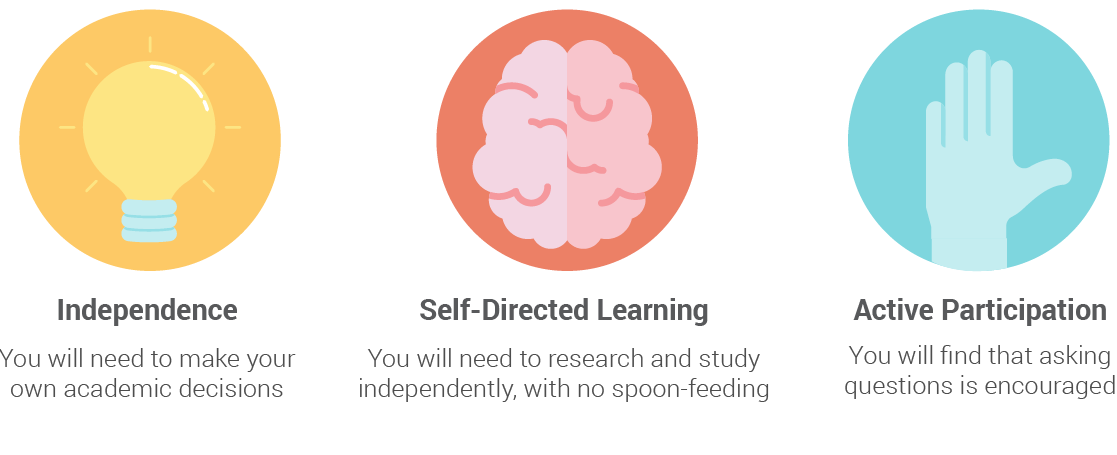 The Australian culture encourages independence above all. Unlike some Malaysian universities, no one will be taking your attendance at lectures and tutorials, nor will lecturers chase you for your overdue assignments. You are expected to be mature enough to make your own decisions.
The Australian culture encourages independence above all. Unlike some Malaysian universities, no one will be taking your attendance at lectures and tutorials, nor will lecturers chase you for your overdue assignments. You are expected to be mature enough to make your own decisions.
For certain courses, the scheduled class time may be a lot less than what you are used to, as you are expected to take on self-directed and independent learning. This means researching information on your own, discovering knowledge and developing new skills to fulfil your academic requirements.
Universities in Australia also value asking questions and active participation in tutorials. As for exams and assignments, you will need to think critically and write argumentatively, instead of simply reproducing and regurgitating the information that you have learned.

#3. Qualifications & Top Universities in Australia
a) Undergraduate Qualifications in Australia
Bathed in confusion trying to decipher the difference between a degree with honours vs. degree without honours, or a double degree vs. double major? Don’t sweat it, as we’re about to break it down for you.
(i) Bachelor’s Degree (With and Without Honours)
In Australia, an undergraduate degree is commonly known as a Bachelor’s degree. This standard degree prepares you for your future career and typically incorporates a minimum of three years of full-time study.
On the other hand, a Bachelor’s degree with Honours (or sometimes shortened to 'Hons') requires an additional one year of research following a Bachelor’s degree. During this period, you will be required to complete an individual research project to produce a thesis.
An honours programme can be considered a postgraduate year in Australia due to the research component. Achieving good grades in your honours year could allow you to pursue a PhD or Doctoral programme without going through a Master’s degree.
DID YOU KNOW
The term “Honours degree" has a different meaning for qualifications from different countries. In Australia, an Honours degree usually requires an additional one-year of research after your Bachelor’s degree, totalling to a study period of 4 years. In the UK, Bachelor’s degrees are normally awarded “with Honours” after 3 years of study.
(ii) Double Degree, Double Major, Major and Minor
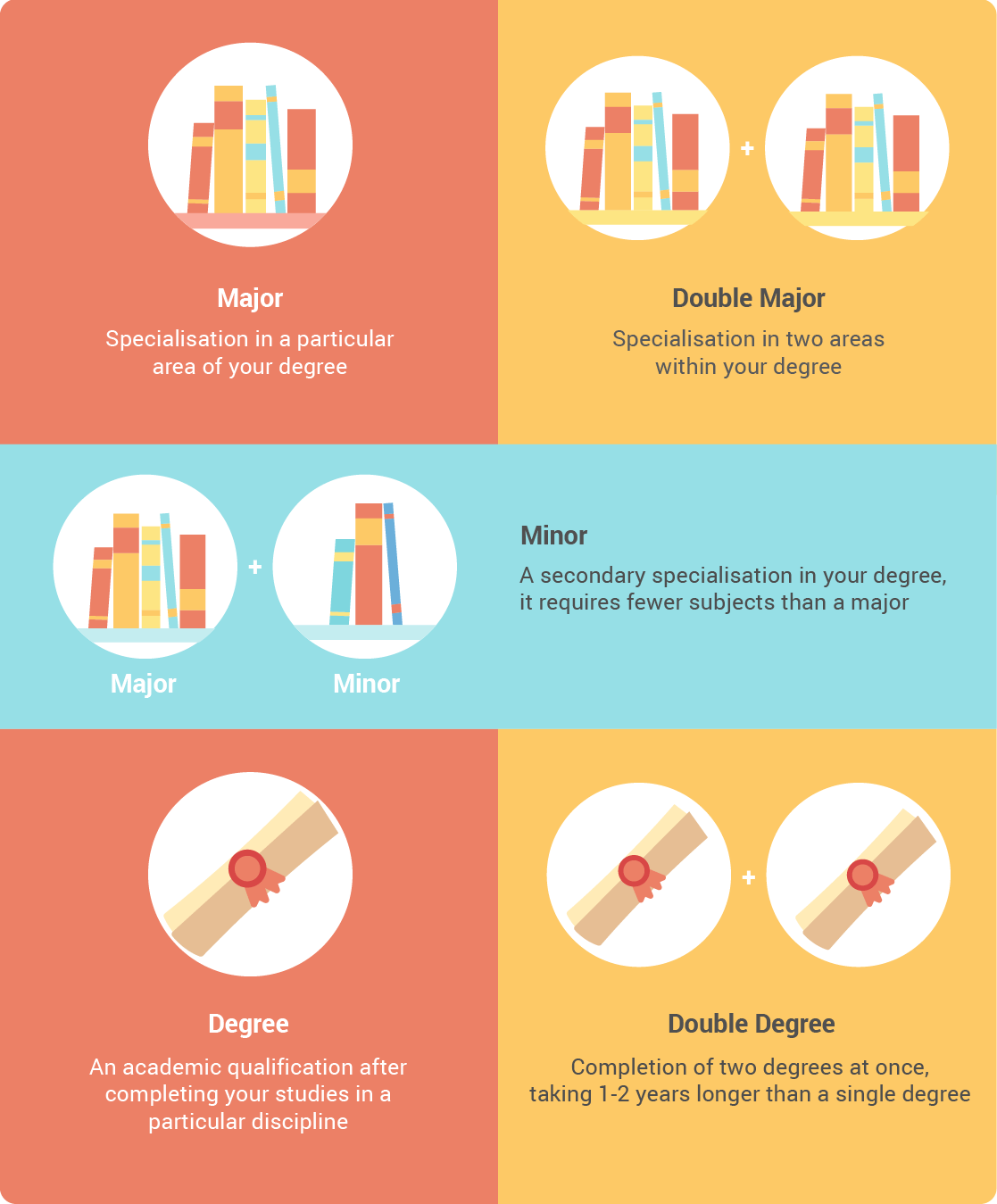
A unique aspect of the Australian higher education system is the concept of major and minor, as well as double major and double degree.
Major
A major is the primary focus of your degree, where you specialise in a specific area. In order to graduate, you must complete the minimum units or points required for at least one major.
For example, you may choose to study a Bachelor of Commerce majoring in Finance or a Bachelor of Commerce majoring in Economics. In both cases, you will have the opportunity to study various business subjects in your first year before choosing a major in your second year, whether it’s Finance, Economics, Accounting, etc.
Double Major
You can also opt to major in two disciplines, called a double major. A double major indicates that you have completed the necessary subject requirements for two different majors, e.g. Bachelor of Commerce majoring in Finance and Economics.
Double Degree
In a double degree, which is different from a double major, you are essentially studying for two different degrees at the same time, where the degrees are usually from different disciplines, e.g. Bachelor of Commerce and Bachelor of Communication. Double degrees can take 1-2 years longer than a single degree.
Minor
Finally, you can also opt to do a minor, which is taken alongside your major. A minor requires fewer subjects than a major, but is still a specialisation in a specific area, e.g. Bachelor of Commerce majoring in Finance and a minor in Economics.
In most instances, students choose either a double degree, double major, single major, or one major and one minor.
b) Top Universities in Australia
Upholding its stature as one of the leading education powerhouses, Australia is home to 43 universities with no less than one university campus stationed in each state or territory. In fact, a handful of Australia’s universities have been consistently cemented as top universities in various world university rankings.
You may have also heard of the term “Group of Eight”, which is a coalition of some of the largest and oldest universities in Australia. Touted as the group of “Australia’s Leading Universities”, these member universities are revered in several areas, going all out in rigorous research to contribute to the world’s stockpile of knowledge.
Here is a list of Australia’s top universities, according to the QS World University Rankings 2016/17 and Times Higher Education World University Rankings 2015-2016, as well as whether the institution is a member of the elite “Group of Eight”.
| University | THE Ranking | QS Ranking | Group of Eight |
|---|---|---|---|
| The University of Melbourne | #33 | #42 | ✓ |
| The Australian National University | #52 | #22 | ✓ |
| The University of Sydney | #56 | #46 | ✓ |
| The University of Queensland | #60 | #51 | ✓ |
| Monash University | #73 | #65 | ✓ |
| University of New South Wales | #82 | #49 | ✓ |
| The University of Western Australia | #109 | #102 | ✓ |
| The University of Adelaide | #149 | #125 | ✓ |
| University of Technology Sydney | #201 - #250 | #193 | |
| University of Wollongong | #251 - #300 | #218 |
c) General Entry Requirements
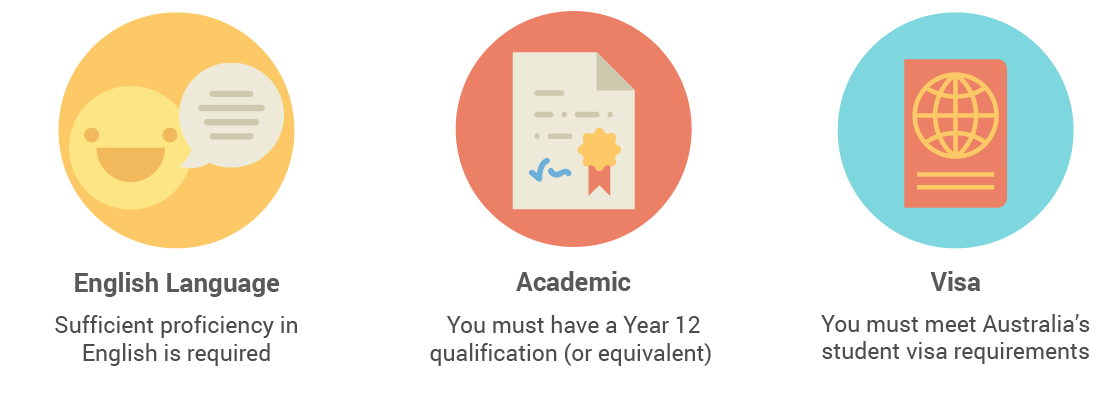
As a potential student keen on studying in Australia, you will need to meet an array of requirements.
(i) English Language Requirements
As English is the language of instruction and assessment in Australia, the minimum academic requirements almost always include a sufficient level of English language proficiency. The majority of the universities accept various English proficiency tests, including IELTS, TOEFL, Pearson Test of English and Cambridge English: Advanced.
(ii) Academic Requirements
The academic requirements you need to study in Australia will vary depending on your desired course of study and which universities you are vying for. Various institutions will call upon different entry requirements, so be sure to scrutinise the course information carefully.
In order to pursue an undergraduate degree in Australia, you will need to possess an Australian Senior Secondary Certificate of Education (Year 12) or equivalent. Such qualifications include SACE International, WACE, A-Level, International Baccalaureate (IB) or SPTM – all which are generally accepted by most Australian universities.
(iii) Visa Requirements
You will only be able to apply for a student visa once you have accepted a place to study at a university in Australia. Although there’s a slew of general and evidential requirements that you have to sail through to obtain a student visa, you will typically need to ensure that you have an offer from a university and prove that you are a genuine student with the financial means to fund your studies in Australia.
d) Average Tuition Costs
Citing Study in Australia (#legit official government site for international students), typical annual tuition fees for international students vary.
| Qualification Level | Estimated Fee Per Year (AUD) | Estimated Fee Per Year (RM) |
|---|---|---|
| Bachelor's Degree | AUD15,000 to AUD33,000 | RM45,000 to RM99,000 |
| Master's Degree | AUD20,000 to AUD37,000 | RM60,000 to RM111,000 |
| Doctoral Degree | AUD14,000 to AUD37,000 | RM42,000 to RM111,000 |
*Based on an exchange rate of AUD 1.00 = RM 3.00 as at the time of writing.
Bear in mind that these are merely ballpark figures to give you a rough idea, and it does not include high value courses such as veterinary science and medicine.
DID YOU KNOW
Another cost to weigh up as part of your fees to your university is the Student Services and Amenities fee, which is a charge for non-academic services and amenities, such as sporting and recreational activities, and employment, career and financial advice. This fee may stretch up to a maximum of AUD290 as of 2016. Not every university in Australia imposes such charges, so make sure you know what to expect.
#4. Cost of Living in Australia
Aside from university tuition fees, there’s also a host of other expenses that you will be incurring as part of your university life. In this section, we outline the estimated living costs as a student in Australia.
a) Student Accommodation
Australia holds a vast range of accommodation options for international students. With selections spanning from university accommodation to private apartments, there’s sure to be one that will tickle your fancy.
The cost and availability of accommodation varies according to the types, between states and territories, as well as city and suburban areas.
(i) University Accommodation
University accommodation (either on-campus or off-campus) is a good option if you are looking for convenience and want a stronger sense of collegiate life. The majority of universities will have residential colleges or halls of residence, with some even offering fully-catered meals to take away the hassle off cooking.
These options range from AUD90 to AUD280 per week.
(ii) Private Rental
Countless students also opt to rent a property directly from private owners and share the cost of rental with housemates. Take note that this would require payment of rent in advance and a security deposit as part of the rental agreement.
On average, shared-rental accommodation costs around AUD85 to AUD215 per week.
b) Living Expenses
Your living costs will fluctuate according to various factors, such as your location and lifestyle (are you a lavish or frugal person).
Nonetheless, here’s an indication of what you might expect to spend on living expenses each week (according to the Australian Government):
| Item | Estimated Costs Per Week (AUD) |
|---|---|
| Groceries and dining out | AUD80 to AUD280 per week |
| Gas and electricity | AUD35 to AUD140 per week |
| Phone and internet | AUD20 to AUD55 per week |
| Public transport | AUD15 to AUD55 per week |
| Misc. personal expenses | AUD80 to AUD150 per week |
In general, capital cities have the highest living costs, with the biggest cities – Sydney and Melbourne – usually sitting at the upper end of the spectrum, and smaller cities – Adelaide and Hobart – being the cheapest.
c) Total Estimated Cost
To paint you a rough cost estimate to study abroad in Australia, we’ve boiled down the average tuition fee and living costs.
Take for instance, the roundup for a Bachelor’s degree in Australia.
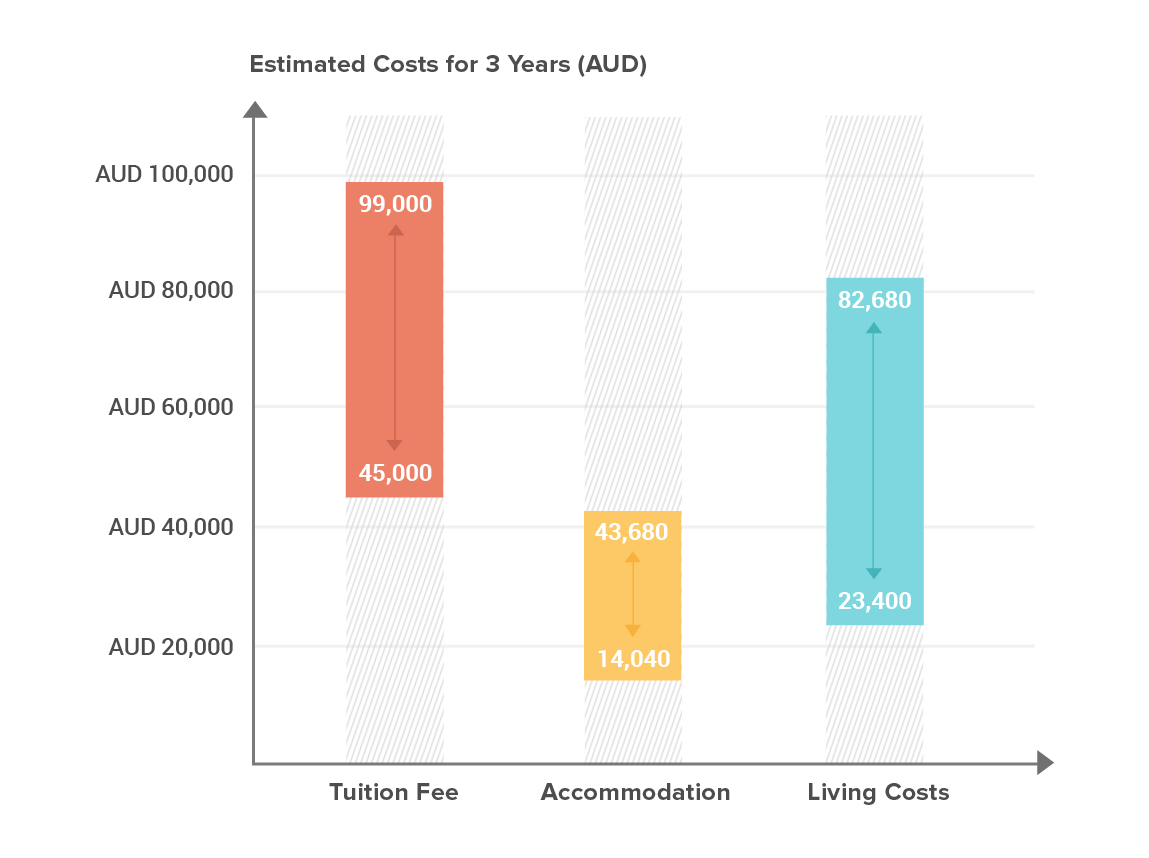
| Item | Estimated Costs | Estimated Costs for 3 Years (AUD) | Estimated Costs for 3 Years (RM) |
|---|---|---|---|
| Tuition Fee | AUD15,000 – AUD33,000 per year | AUD45,000 – AUD99,000 | RM135,000 – RM297,000 |
| Accommodation | AUD90 – AUD280 per week (shared private apartment) | AUD14,040 – AUD43,680 | RM42,120 – RM131,040 |
| Living Costs | AUD150 – AUD530 per week (food, utilities, transport) | AUD23,400 – AUD82,680 | RM70,200 – RM248,040 |
| Total Estimate | AUD82,440 – AUD225,360 | RM247,320 – RM676,080 | |
In summary, you can expect to spend a total of between RM247,000 to RM676,000 for a 3-year degree in Australia. The biggest variable is the living costs, where you can save a substantial amount of money by spending wisely.

#5. Scholarships & Financial Aid for International Students in Australia
Scouting for financial assistance to subsidise your barbecues and surfing affairs dream to study at a prestigious Australian university? Here’s the low-down on some of the scholarships that you can hunt down to experience world-class education in Australia.
a) Types of Scholarships
Many types of scholarships and financial assistance are offered to international students, covering a range of costs such as tuition fees, accommodation, airfares and living expenses.
Some of the more illustrious scholarships will cover the full amount of these costs, while others may cover a proportion of the total cost, either by supporting the costs for one year or providing a one-off payment for financial assistance.
Conditions for scholarships differ, but many will be based on academic merit, although some are for disadvantaged students or those who are in genuine financial need. Certain scholarships are dedicated solely to students from specific countries, while others may be associated to a particular course, field of study or level of study (postgraduate studies only, for instance).
Unfortunately, government education loans (such as PTPTN) are not offered for international students studying in Australia.
b) Scholarship Providers
Scholarships may be granted by the following samaritans:
(i) Australian Universities
Many universities in Australia offer scholarships for enrolling international students. Most scholarships have specific conditions (e.g. area of study, level of study, nationality, financial need, etc.) so you’ll need to check your eligibility carefully.
A good place to start is the Australian Government’s Study in Australia Scholarship Database, which lists all the scholarships available by institution. You can also go through the individual university’s website for additional details.
(ii) Australian Government
The Australian Government grants an extensive range of scholarships for international students under the Australia Awards scheme.
For Malaysians specifically, you can check out Endeavour Scholarships & Fellowships for postgraduate and vocational education.
(iii) Malaysian Government (JPA)
Closer to home, Malaysia’s Public Services Department (or more commonly known as JPA) is one of the most popular choices if you’re eyeing a full scholarship to study abroad. However, with the recent budget cuts by the government, only a handful of students will be able to study abroad via a JPA scholarship.
(iv) Malaysian Companies & Organisations
Various private and government-linked companies also offer scholarships to Malaysians to study abroad. Some of the best known GLCs and companies offering these prestigious scholarships include Petronas, Khazanah, Bank Negara and Sime Darby.
There are also special scholarships by the Malaysian Australian Alumni Council (MAAC) catered specifically for Malaysians wishing to study abroad in Australia.
#6. Applying to Study Abroad in Australia

So you’ve decided to take the leap and kickstart your application process to some of your dream universities in Australia. Here’s a guide on how you can do it.
a) How to Apply
Step 1: Choose your preferred course and university
This is the most crucial step of all. Find out what courses are offered at which university, and make a shortlist of your desired universities.
Not all courses and universities are created equal, so it’s important that you consider various factors and options – academic strength in your chosen field of study (remember that no one university is good at every discipline), location, cost of living and student community, lifestyle and support are all things that you may want to consider.
Step 2: Submit your application to your desired university
Unlike certain countries, Australia does not have a centralised system where you can apply for several universities using a single application form.
You will need to check through the university’s website, understand the application process, and send in an application. If you are planning to apply for more than one university, be prepared to fill in and submit several different applications.
Some universities may require you to pay an application fee, while others are free.
Step 3: Accept your offer to study
If your application is successful, you will receive a letter of offer from the university (yay!).
If the offer is a conditional offer, it means that you will be granted a place to study if you fulfil the conditions stated in your letter. If it is an unconditional offer, it means that you have already fulfilled all the requirements, and can accept the offer immediately.
Step 4: Receive your Confirmation of Enrolment (CoE)
Once you’ve accepted your offer, you will receive a Confirmation of Enrolment (CoE). This is required in order for you to apply for a student visa; otherwise, your visa application will be rejected.
Step 5: Apply for your student visa
Now comes the tedious part – proving to the Australian Government that you are a genuine student, eager (and financially able) to immerse yourself in world-class education.
As a quick checklist, here are some of the key requirements that you need to meet:
- Confirmation of Enrolment (CoE) certificate from an Australian university
- Proof that you are a genuine student intending to stay temporarily in Australia (Genuine Temporary Entrant requirement)
- English language proficiency
- Proof of sufficient funds for airfares, course fees and living expenses
- Health and character requirements
- Acceptable Overseas Student Health Cover (OSHC)
Once you have received your student visa, you can start to pack and organise your departure for an unforgettable study experience.
PRO TIP
To land yourself a student visa, you must demonstrate that you possess sufficient financial resources for the duration of your stay. According to Australia’s Department of Immigration, the living cost is roughly AUD19,830 (approx. RM59,490) per year.
b) When to Apply
Application deadlines for individual universities may differ, so it’s crucial that you do your research.
In general, most Australian universities have two intakes – one in early March (usually the larger intake) and another in July. As a rule of thumb, if you are intending to start your studies in March, the application deadline for most universities is late December. For the July intake, it is best that you apply by end May.
Some universities may accept forecast results or predicted grades, which means that you can apply even before receiving your final grades. In this instance, you will normally receive a conditional offer, where you will only secure a place at the university if you meet the requirements.
#7. Opportunities in Australia After Graduation
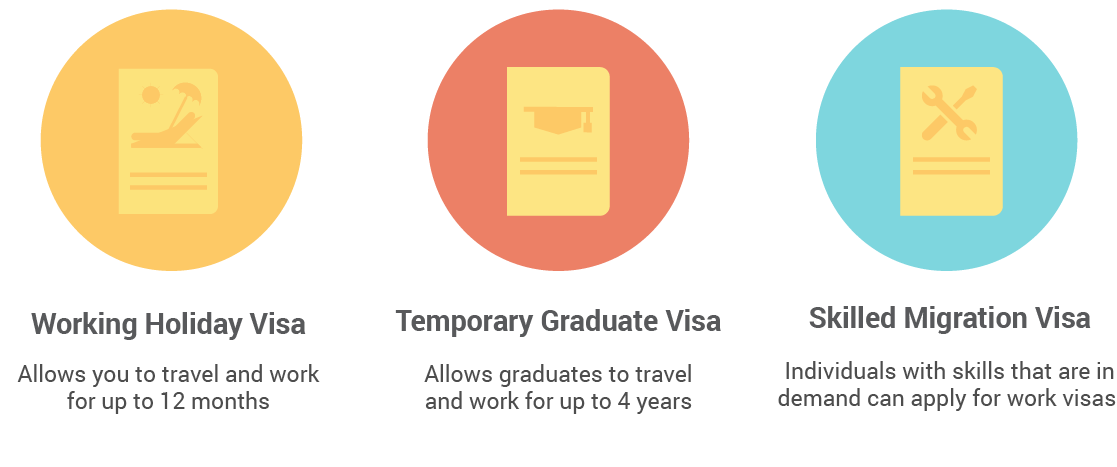
When your studies in Australia have come to an end, and if it seems justified for you to extend your time in the country – be it to round off your further studies, embark on your career or satisfy your wanderlust – fret not, because the Australian government has got you covered.
a) Take a Working Holiday
If you are between 18 and 30 years old, and have a passport from an eligible country, you can apply for a Working Holiday Visa or a Work and Holiday Visa. Both these visas will allow you to work and travel in Australia for up to 12 months.
b) Get a Temporary Graduate Visa
Your best bet to stay in the country without being tied to a specific employer or a type of work, a Temporary Graduate visa (subclass 485) makes it possible for international students who studied in Australia for at least 2 academic years to remain in the country for up to 4 years.
The duration of this visa depends on your level of qualification:
- Diploma or trade qualification – 18 months
- Bachelor's Degree (with or without Honours), Master's by Coursework Degree – 2 years
- Master's by Research Degree – 3 years
- Doctoral Degree – 4 years
c) Secure a Visa as a Skilled Migrant
If you have the right skills in a specific area that is in demand, you can try applying for a working visa that will allow you to live and work in the country.
Australia has different work visas with different requirements. Some may require employer sponsorship, some are based on a points system, and some have a maximum visa duration. It's important to check through the details to see if you qualify.
In addition, you can also refer to SkillSelect, an online service where skilled workers interested in working or migrating to Australia can leave their details. By using SkillSelect, you could be nominated for a skilled visa by an Australian employer or state and territory governments, or you could be invited by the Australian Government to lodge a visa application.
Given Australia’s impressive education pedigree, there is no shortage of good reasons to study abroad in Australia. Fundamentally, Australia offers courses of exceptional quality that lead to many positive returns, including sought-after skills, that will effectively equip you for the world of work.
So, get ready to sun, sand, surf and study!
